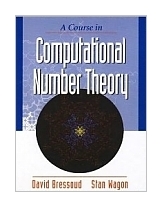A Course in Computational Number Theory uses the computer as a tool for
motivation and explanation. The book is designed for the reader to quickly access a
computer and begin doing personal experiments with the patterns of the integers.
It presents and explains many of the fastest algorithms for working with
integers. Traditional topics are covered, but the text also explores factoring algorithms,
primality testing, the RSA public-key cryptosystem, and unusual applications such as check
digit schemes and a computation of the energy that holds a salt crystal together. Advanced
topics include continued fractions, Pell’s equation, and the Gaussian primes.
The CD-ROM contains a Mathematica® package that has hundreds of functions
that show step-by-step operation of famous algorithms. (The user must have Mathematica in
order to use this package.)
Also included is an auxiliary package that contains a database of all 53,000
integers below 10^16 that are 2- and 3-strong pseudoprimes. Users will also have access to
an online guide that gives illustrative examples of each function.
Table of Contents
Preface v
Notation xi
Chapter 1 Fundamentals 1
1.0 Introduction 1
1.1 A Famous Sequence of Numbers 2
1.2 The Euclidean ALgorithm 6
The Oldest Algorithm
Reversing the Euclidean Algorithm
The Extended GCD Algorithm
The Fundamental Theorem of Arithmetic
Two Applications
1.3 Modular Arithmetic 25
1.4 Fast Powers 30
A Fast Alforithm for ExponentiationPowers of Matrices, Big-O Notation
Chapter 2 Congruences, Equations, and Powers 41
2.0 Introduction 41
2.1 Solving Linear Congruences 41
Linear Diophantine Equations in Two Variables
The Conductor
An Importatnt Quadratic Congruence
2.2 The Chinese Remainder Theorem 49
2.3 PowerMod Patterns 55
Fermat's Little Theorem
More Patterns in Powers
2.4 Pseudoprimes 59
Using the Pseudoprime Test
Chapter 3 Euler's Function
3.0 Introduction 65
3.1 Euler's Function 65
3.2 Perfect Numbers and Their Relatives 72
The Sum of Divisors Function
Perfect Numbers
Amicalbe, Abundant, and Deficient Numbers
3.3 Euler's Theorem 81
3.4 Primitive Roots for Primes 84
The order of an Integer
Primes Have PRimitive roots
Repeating Decimals
3.5 Primitive Roots for COmposites 90
3.6 The Universal Exponent 93
Universal Exponents
Power Towers
The Form of Carmichael Numbers
Chapter 4 Prime Numbers 99
4.0 Introduction 99
4.1 The Number of Primes 100
We'll Never Run Out of Primes
The Sieve of Eratosthenes
Chebyshev's Theorem and Bertrand's Postulate
4.2 Prime Testing and Certification 114
Strong Pseudoprimes
Industrial-Grade Primes
Prime Certification Via Primitive Roots
An Improvement
Pratt Certificates
4.3 Refinements and Other Directions 131
Other PRimality Tests
Strong Liars are Scarce
Finding the nth Prime
4.4 A Doszen Prime Mysteries 141
Chapter 5 Some Applications 145
5.0 Introduction 145
5.1 Coding Secrets 145
Tossing a Coin into a Well
The RSA Cryptosystem
Digital Signatures
5.2 The Yao Millionaire Problem 155
5.3 Check Digits 158
Basic Check Digit Schemes
A Perfect Check Digit Method
Beyond Perfection: Correcting Errors
5.4 Factoring Algorithms 167
Trial Division
Fermat's Algorithm
Pollard Rho
Pollard p-1
The Current Scene
Chapter 6 Quadratic Residues 179
6.0 Introduction 179
6.1 Pepin's Test 179
Quadratic Residues
Pepin's Test
Primes Congruent to 1 (Mod 40
6.2 Proof of Quadratic Reciprocity 185
Gauss's Lemma
Proof of Quadratic Recipocity
Jacobi's Extension
An Application to Factoring
6.3 Quadratic Equations 195
Chapter 7 Continuec Faction 201
7.0 Introduction 201
7.1 FInite COntinued Fractions 202
7.2 Infinite Continued Fractions 207
7.3 Periodic Continued Fractions 213
7.4 Pell's Equation 227
7.5 Archimedes and the Sun God's Cattle 232
Wurm's Version: Using Rectangular Bulls
The Real Cattle Problem
7.6 Factoring via Continued Fractions 238
Chapter 8 Prime Testing with Lucas Sequences 247
8.0 Introduction 247
8.1 Divisibility Properties of Lucas Sequencese 248
8.2 Prime Tests Using Lucas Sequencesse 259
Lucas Certification
The Lucas-Lehmer Algorithm Explained
Luca Pseudoprimes
Strong Quadratic Pseudoprimes
Primality Testing's Holy Grail
Chapter 9 Prime Imaginaries and Imaginary Primes 279
9.0 Introduction 279
9.1 Sums of Two Squares 279
9.2 The Gaussian Intergers 302
Complex Number Theory
Gaussian Primes
The Moat Problem
The Gaussian Zoo
9.3 Higher Reciprocity 325
Appendix A. Maathematica Basics 333
1.0 Introduction 333
A.1 Plotting 335
A.2 Typesetting 338
Sending Files By E-Mail
A.3 Types of Functions 341
A.4 Lists 343
A.5 Programs 345
A.6 Solving Equations 347
A.7 Symbolic Algebra 349
Appendix B Lucas Certificates Exist 351
References 355
Index of Mathematica Objects 359
Subject Index 363
384 pages, Hardcover
Księgarnia nie działa. Nie odpowiadamy na pytania i nie realizujemy zamówien. Do odwolania !.


